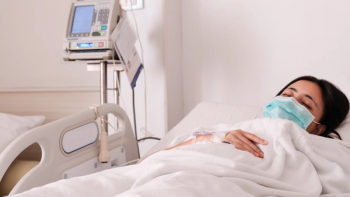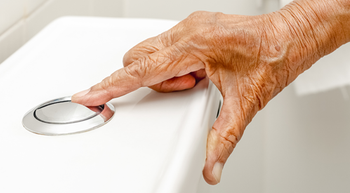
Meredith Cummings, BSN, RN, OCN, discusses the potential benefit of machine learning in predicting symptoms for patients with head and neck cancer.

Meredith Cummings, BSN, RN, OCN, discusses the potential benefit of machine learning in predicting symptoms for patients with head and neck cancer.

Meredith Cummings BSN, RN, OCN, highlights her research on machine learning and its potential application in optimizing symptom management.

Kara Morris, MSN, RN, OCN; and Christine Wylie, MSN, RN, OCN, discuss their research on oral cryotherapy as a mucositis mitigation strategy.

Shivani Gopalsami, RN, MSN, ANP-BC, AOCNP; and Tia Wheatley, DNP, RN, AOCNS, BMTCN, highlight the value of multidisciplinary approaches in hematopoietic stem cell transplantation care.

Yelena Shames, MSA, ACNP-BC, CNRN, argues that frequent hematologic evaluations may not always be warranted with immune checkpoint inhibitors.

Appropriate monitoring of infusion-related reactions requires up-to-date knowledge of the latest criteria for adverse event management, health system policies, and protocols for reporting.

Seth Eisenberg, ASN, RN, OCN, BMTCN, emphasizes the importance of reducing nurse exposure to hazardous drugs—and ongoing research efforts to improve nursing safety.

Applying weighted blankets for 20 minutes reduced patient anxiety during cancer infusions.

Alyssa Ridad BSN-RN, OCN; and Amanda McKaig, BSN, RN, OCN, discuss oncology nurse perceptions of medical cannabis.

Stephanie Jackson, DNP, MSN, RN, AOCNS, BMTCN, discusses how her institution improved double-check compliance with high-alert medications.

Jessica MacIntyre, DNP, MBA, APRN, NP-C, AOCNP, describes how nurses used an app imbedded in the electronic medical record to refer patients to the Leukemia & Lymphoma Society.

Yelena Shames, MSA, ACNP-BC, CNRN, discusses when immune checkpoint inhibitor treatment should be paused because of laboratory abnormalities.

Johanna Garibaldi, BSN, RN, EMT-P, discusses how a mobile clinic improved cancer screening rates among local firefighters.

Elizabeth Loach, MSN, APRN, CNS, AGCNS-BC, OCN, highlights how the Oncology Nurse Leader Council at her institution led to frontline nurse task-force engagement.

Elizabeth R. Cullen, MSN, ARNP, provides an overview of avasopasem manganese and its potential role in reducing severe oral mucositis for patients undergoing radiotherapy.

Donna Catamero, ANP-BC, OCN, CCRC, highlights best nursing practices with teclistamab.

Tia Wheatley, DNP, RN, AOCNS, BMTCN, and Shivani Gopalsami, RN, MSN, ANP-BC, AOCNP, discuss the benefits and challenges of multidisciplinary collaboration in hematopoietic stem cell transplant care.

Seth Eisenberg, ASN, RN, OCN, BMTCN, discusses his research comparing plastic-backed pads and the Splashblocker.

Patricia Jakel, RN, MN, AOCN, underscores some of the challenges nurses face when promoting adherence to oral medications.

Kellie Zeichner BSN, RN, OCN, explains how her institution created a standardized monitoring procedure for insulinoma care.

Brenda Martone MSN, ANP-BC, AOCNP, discusses what nurses need to know about safely treating patients with darolutamide.

Kara Morris, MSN, RN, OCN; and Christine Wylie, MSN, RN, OCN, discuss the benefits of oral cryotherapy for patients receiving dose-dense doxorubicin.

Melanie Darvish, BSN, RN, shares her experience attending the Oncology Nursing Society (ONS) Congress with an ONS Scholarship.

AnnMarie Walton, PhD, MPH, RN, OCN, CHES, FAAN, discusses her research on plastic-backed pads and discusses the importance of better methods to reduce exposure to antineoplastic drug residue.

Sarah Low RN, MSN, OCN, CMSRN; and Claudia Maldonado-Howell, RN, MSN, FNP, BS, CMSRN, discuss their research on wearable technology.

Heather Niccum Haag, BSN, RN, CCRN, shares her experience creating an educational resource for her patients with Von-Hippel Lindau tumors who are receiving belzutifan.

Elizabeth Loach, MSN, APRN, CNS, AGCNS-BC, OCN, discusses the importance of including frontline nurses in nursing leadership task forces.

The Splashblocker was found to be an effective way to reduce contaminated particles. Plastic backed pads had mixed reviews.

Kathleen Gander DNP, APRN, CNS; and Sarah Middlekauff, MSN, RN, OCN, relay their experiences in implementing a hepatic artery infusion pump educational intervention for oncology nurses.

Oncology nurse investigators from Dana-Farber discuss the value of weighted blankets in reducing patient anxiety during infusions.